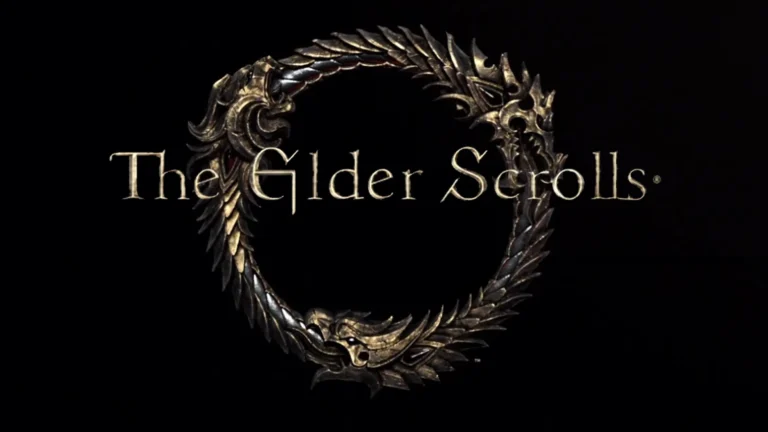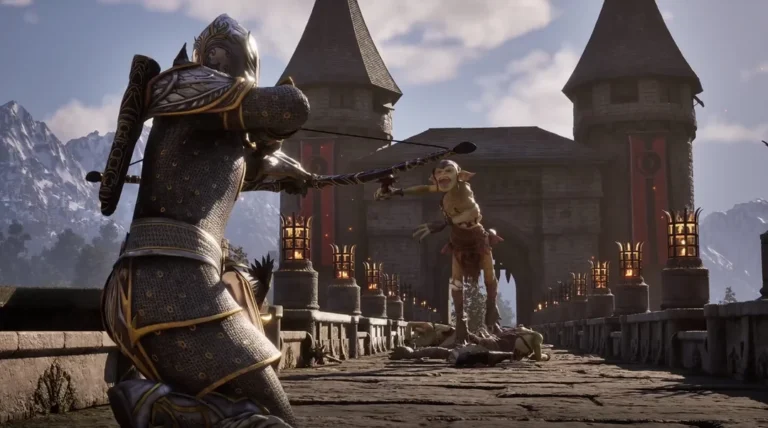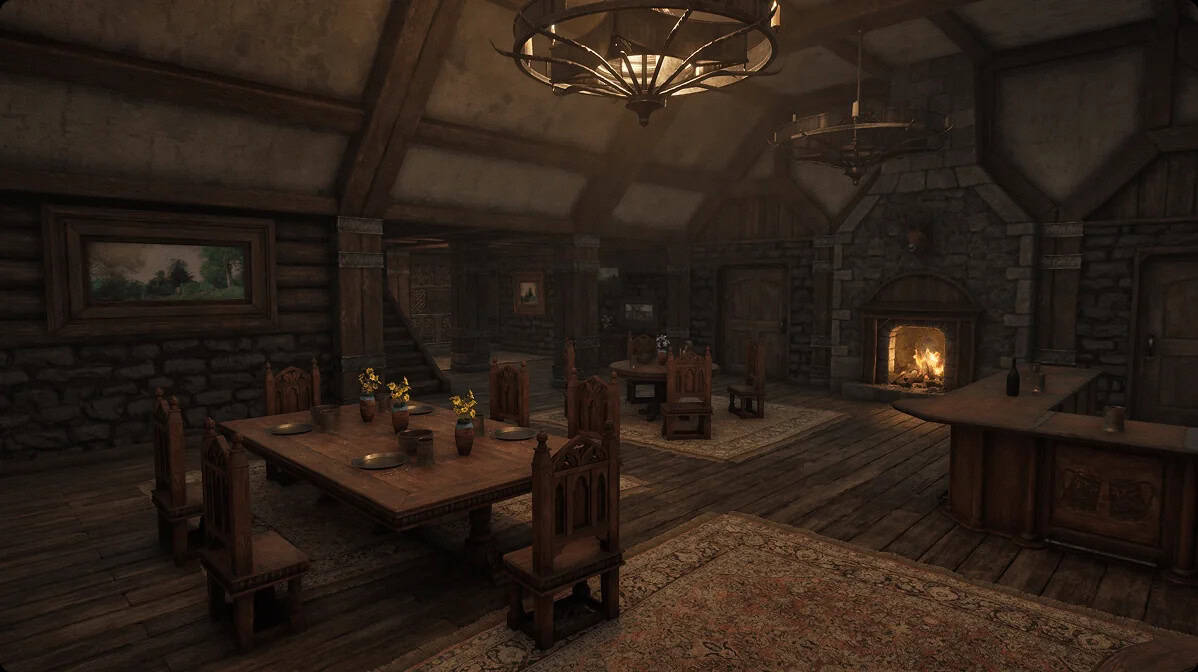
The gates of Cyrodiil have opened once more—at least unofficially. A flurry of leaked images and details from The Elder Scrolls IV: Oblivion Remastered has reignited interest in the classic RPG and stirred intense debate across the gaming community. Sourced from a prematurely live page on developer Virtuos’ website, the leaks offer a glimpse at a modernized version of the beloved 2006 game, complete with revamped visuals, gameplay tweaks, and platform confirmations.
But as with any modern resurrection of a classic, fan reactions are split. Is this a love letter to the original or a tone-deaf reinterpretation?
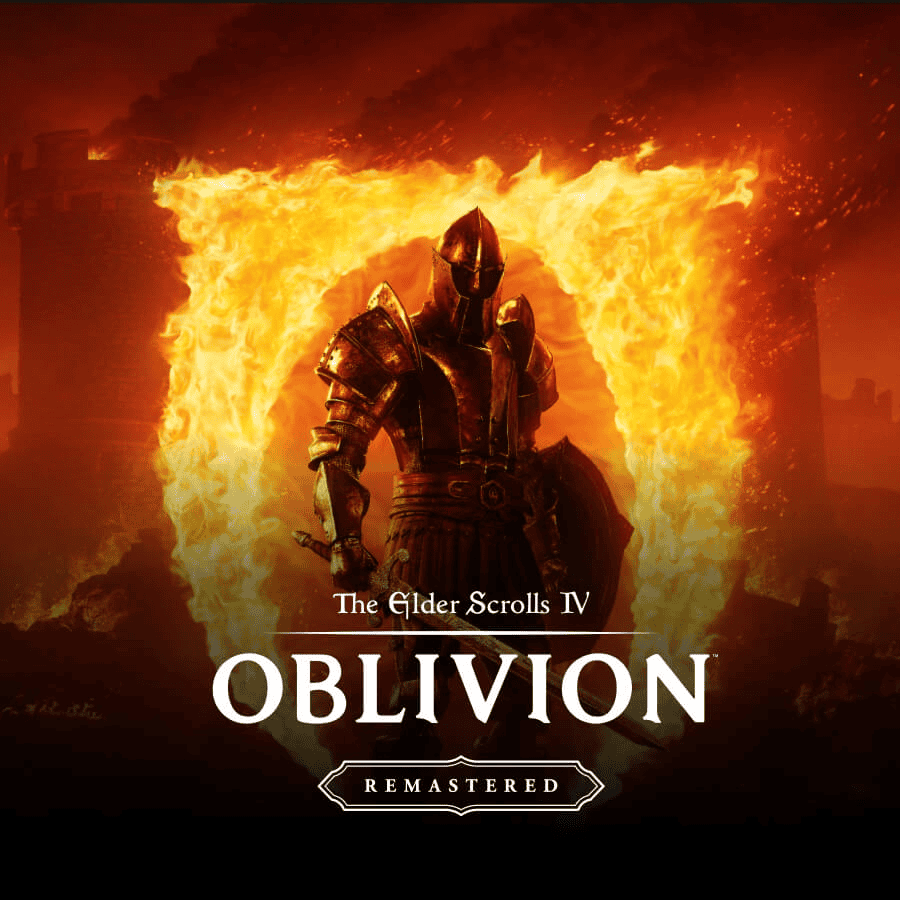
Unreal Engine Power Meets 2000s Nostalgia
The biggest change? A shift to Unreal Engine 5. This upgrade promises smoother lighting, sharper textures, and improved character models that look far more grounded in modern gaming standards. The HUD has been streamlined, animations have been polished, and the entire world of Cyrodiil appears to have undergone a visual overhaul.
Yet that very polish is what’s dividing longtime fans. Critics argue the remaster has lost the quirky, painterly charm of the original—something that made Oblivion feel unique, even if it didn’t always look “good” by today’s standards. The muted color palette in the leaked shots sparked immediate backlash from those nostalgic for the bright, dreamy tones of the original game.
One popular comment circulating in fan forums reads: “It’s lost that weirdly magical vibe. Oblivion used to look like a fantasy painting—you could feel the strange, slightly off-kilter magic. This looks like every other gritty RPG now.”
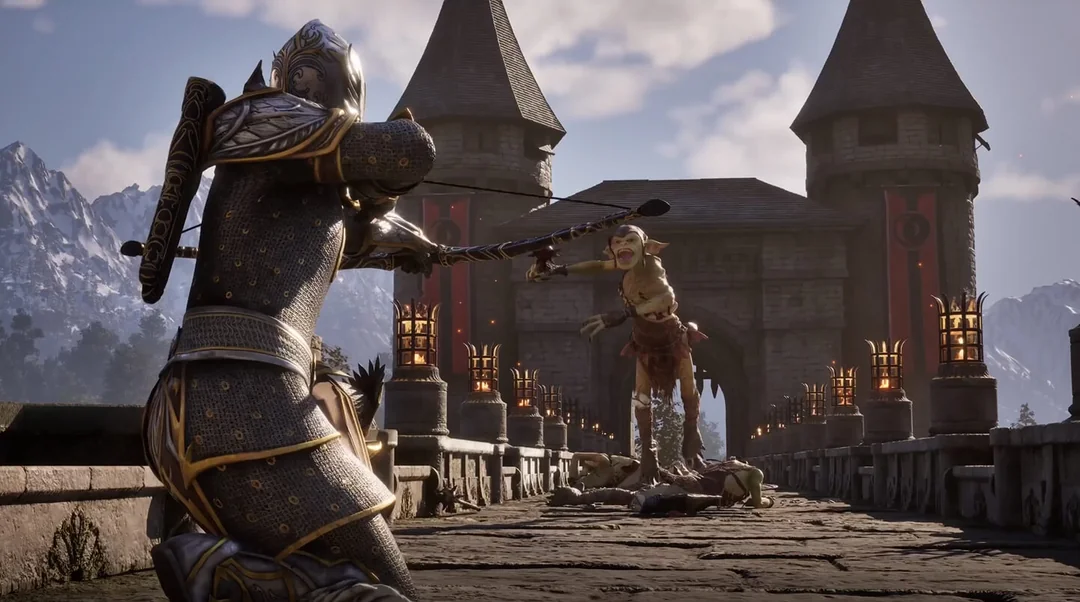
Others, however, see this as the evolution Oblivion desperately needed. “Let’s not pretend those faces aged well,” one fan responded. “I want to re-experience the nostalgia without being pulled out by potato NPCs.”
Revamped Mechanics: More Than Just a Pretty Face
According to the leaks, Oblivion Remastered isn’t just about upgraded textures. Key gameplay systems are being reworked to align with modern expectations, drawing inspiration from Souls-like combat systems and enhanced RPG mechanics:
- New blocking system that emphasizes timing and positioning.
- Stamina overhaul, potentially encouraging more strategic combat.
- Improved archery mechanics with first- and third-person aiming refinements.
- Redesigned stealth mechanics, including clearer sneak detection feedback.
- Updated HUD, with a cleaner and more immersive interface.
These changes aim to modernize the sometimes clunky systems of the original without rewriting its DNA. Whether that balance is achieved remains to be seen.
Deluxe Edition & The Return of Horse Armor (Yes, Seriously)
Leaked listings suggest a Deluxe Edition will be available, and in a wink to longtime fans (or perhaps a jab), it includes the infamous Horse Armor DLC. The original 2006 paid horse armor was mocked endlessly at the time but has since become a meme-worthy part of Elder Scrolls history.
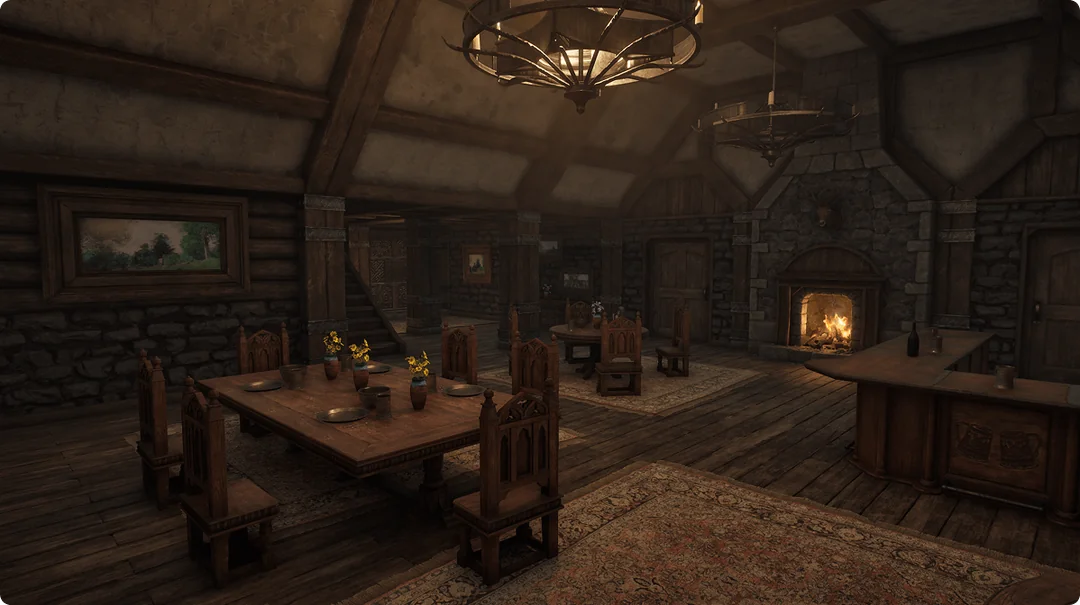
In a remaster packed with callbacks and nods to the past, its return feels almost poetic.
Shadow Drop Speculation and Game Pass Launch
Perhaps most intriguing is the timing. Multiple insiders—including some with solid track records—are pointing toward a shadow drop sometime this spring, potentially aligned with The Elder Scrolls Online anniversary celebrations or Xbox’s next major showcase. Some leaks even hint at an April release, ahead of the previously speculated June window.
Adding more fuel to the hype, the remaster is reportedly coming to Xbox Game Pass on day one, which would dramatically increase accessibility and visibility across platforms. Confirmed platforms so far include:
- Xbox Series X|S
- PlayStation 5
- PC (Steam)
No word yet on any Switch version or backwards compatibility with older consoles.
A Delicate Balancing Act
Remastering a game like Oblivion is no small feat. The original, with its surreal charm, strange voice acting quirks, and vibrant palette, occupies a weird and wonderful corner of gaming history. Capturing that essence while applying modern expectations is a high-wire act that many studios have failed to pull off.
Virtuos, known for co-developing several high-profile remasters, appears to be taking big swings—both in terms of technical upgrades and gameplay revisions. Whether those swings connect with longtime fans or alienate them will depend on execution.
For now, the internet is doing what it does best: scrutinizing every frame, frame-by-frame, in the hopes of deciphering what’s next for the once-sleepy province of Cyrodiil.
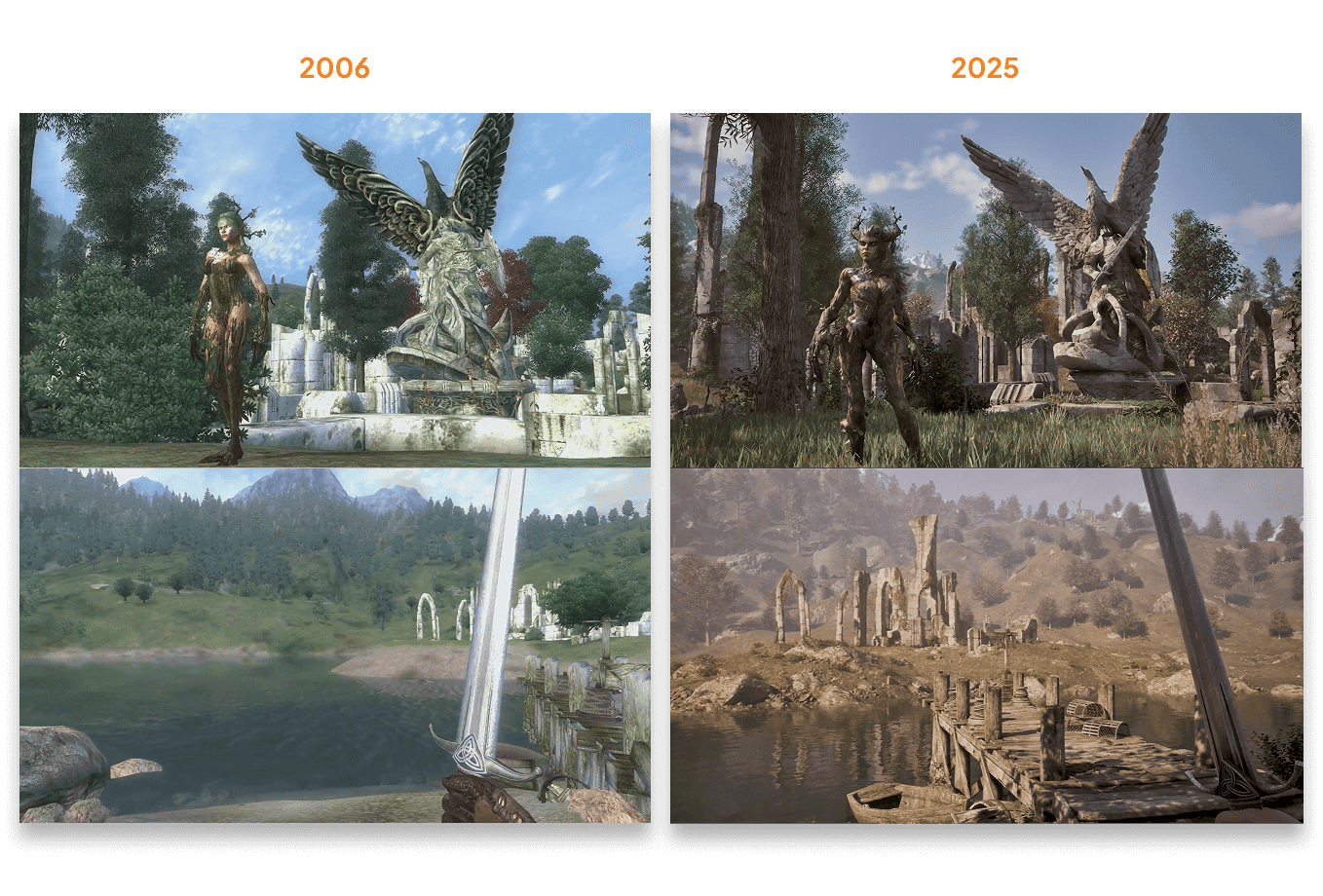
Whether you’re excited, skeptical, or somewhere in between—one thing is certain: Oblivion is back in the conversation. And that alone is enough to stir excitement in the hearts of Tamriel’s most loyal adventurers.
Key Takeaways
- The Oblivion remake announcement is expected between March and April 2025 with a release potentially following shortly thereafter.
- The remake is reportedly built in Unreal Engine, promising significant visual and technical improvements over the original.
- The project’s timeline has apparently been accelerated, with launch possibly coming earlier than the initially rumored June 2025 window.
Background on Bethesda and the Elder Scrolls Series
Bethesda Game Studios has shaped the landscape of RPGs for decades through their pioneering Elder Scrolls series. Their unique blend of immersive worldbuilding and open-ended gameplay has influenced countless developers in the industry.
Bethesda’s Reputation in the Gaming Industry
Bethesda has built its reputation as one of gaming’s most influential developers since its founding in 1986. The studio gained widespread recognition for its commitment to creating vast open worlds where player choice matters.
Under the leadership of Todd Howard, Bethesda has developed a distinct formula for their RPGs: expansive worlds, player freedom, and deep lore. Their games are known for their modding communities, with Bethesda actively supporting fan creations that extend the lifespan of their titles.
Despite occasional controversies like the rocky launch of Fallout 76, Bethesda’s ability to craft memorable gaming experiences has maintained their position as an industry leader. You can see their influence in countless open-world games that followed their blueprint.
The Legacy of The Elder Scrolls IV: Oblivion
Released in 2006, The Elder Scrolls IV: Oblivion represented a significant leap forward for open-world RPGs. Its detailed world of Cyrodiil captivated players with unprecedented freedom and immersion.
Oblivion introduced many innovations that became staples of the genre:
- The radiant AI system for NPC behavior
- A dynamic fast-travel system
- Fully voiced dialogue for all characters
- Physics-based object interaction
The game’s main questline involving demonic invasions alongside memorable guild quests gave players countless hours of content. You might remember iconic moments like the Dark Brotherhood’s “Whodunit?” quest or the surreal Shivering Isles expansion.
Oblivion’s technical achievements earned it Game of the Year honors and cemented Bethesda’s reputation for crafting engrossing fantasy worlds.
The Evolution of Elder Scrolls Games
The Elder Scrolls series has continuously evolved since Arena’s release in 1994. Each title has expanded the formula while maintaining the core focus on exploration and player choice.
Major Elder Scrolls Releases:
- Arena (1994) – The foundation of the series
- Daggerfall (1996) – Massive procedurally generated world
- Morrowind (2002) – Distinctive alien landscape and deeper roleplaying
- Oblivion (2006) – Mainstream breakthrough with accessible gameplay
- Skyrim (2011) – Cultural phenomenon that sold over 30 million copies
Skyrim’s unprecedented success brought the franchise to new heights, with multiple re-releases across generations of consoles. Meanwhile, The Elder Scrolls 6 remains in development as fans eagerly await the next chapter.
Each game has built upon its predecessors while refining systems like combat, magic, and crafting. You can trace the DNA of the original games through to their modern incarnations, even as graphical fidelity and gameplay mechanics have advanced dramatically.
The Announcement of the Oblivion Remake
Excitement continues to build around Bethesda’s highly anticipated remake of The Elder Scrolls IV: Oblivion. Recent leaks suggest fans won’t have to wait much longer to return to Cyrodiil with modern graphics and gameplay improvements.
Initial Reports and Rumors
The gaming community first caught wind of the potential Oblivion remake through several credible leakers. Most notably, insider NateTheHate reported that Bethesda plans to reveal the Oblivion remake between March and April 2025.
What makes this leak particularly exciting is the suggestion that the game might be released shortly after its announcement. According to recent updates, Bethesda may even “shadow drop” the remake as early as April 2025.
Multiple sources have corroborated these claims, with Polygon reporting the game could be available by June. This quick turnaround between announcement and release would be unusual for Bethesda but incredibly welcome for eager fans.
Official Confirmation From Bethesda
As of March 16, 2025, Bethesda has not yet provided official confirmation about the Oblivion remake. The company maintains its characteristic silence despite the growing rumors.
Industry analysts expect this could change any day now. With the reported announcement window of March-April 2025 already underway, many are watching Bethesda’s social media accounts and press releases with heightened attention.
You should keep an eye on upcoming gaming events where Bethesda might choose to make their announcement. The company has historically favored showcases where they can properly demonstrate their games’ features and visual improvements.
Expected Features and Enhancements
The Oblivion remake is reportedly being built on Unreal Engine 5, suggesting a significant visual overhaul rather than a simple remaster. This would allow for:
- Modern lighting and shadow systems
- Improved character models and animations
- Enhanced environmental details and draw distances
- More immersive weather and atmospheric effects
You can expect the remake to maintain the original’s beloved questlines and world design while upgrading the combat mechanics and UI to feel more contemporary. The iconic Radiant AI system will likely receive improvements to make NPC behaviors more realistic.
Voice acting remains a big question, as fans wonder if Bethesda will preserve the original performances (including Patrick Stewart’s) or re-record dialogue with a larger cast of voice actors to address the original’s limited variety.
The Role of the Unreal Engine 5
The remake of Elder Scrolls IV: Oblivion leverages Unreal Engine 5 to dramatically transform the classic RPG experience. This powerful engine brings modern technical capabilities and visual enhancements that will make Cyrodiil more immersive than ever before.
Technical Capabilities of Unreal Engine 5
Unreal Engine 5 introduces several revolutionary technologies that will benefit the Oblivion remake. The engine’s Nanite system allows for highly detailed environments with billions of polygons, meaning you’ll see unprecedented detail in Cyrodiil’s landscapes and architecture.
Lumen, the real-time global illumination system, creates dynamic lighting that adjusts naturally as you explore dungeons or witness day-night cycles. This technology eliminates the need for pre-calculated lighting, resulting in more realistic shadows and ambient light.
The engine’s World Partition system will likely improve how you experience the open world, with seamless transitions between areas that were previously separated by loading screens. For a game as exploration-focused as Oblivion, this represents a significant advancement.
Enhancements from the Original Game Engine
The Unreal Engine 5 remake offers substantial improvements over the original GameBryo engine used in 2006. You’ll immediately notice enhanced character models with more realistic animations and facial expressions during conversations.
Weather systems are expected to be more dynamic and impactful, with volumetric clouds, realistic precipitation, and improved particle effects making storms feel genuinely threatening. The original game’s somewhat stiff character movement will likely be replaced with fluid, physics-based animations.
Combat mechanics may benefit from UE5’s improved physics system, potentially making spells more visually impressive and melee combat more responsive. Reports suggest the remake includes “updated gameplay systems and a much-improved HUD” to complement these visual enhancements.
Water rendering, a notable feature in the original game, will likely reach new heights with UE5’s advanced fluid simulation capabilities.
Gameplay Improvements and Additions
The rumored Oblivion remake is expected to modernize the original game’s mechanics while preserving its distinctive RPG feel. Fans can anticipate significant updates to core systems that address the original’s limitations.
Combat System Overhaul
The combat mechanics in the remake will likely receive a substantial upgrade from the original’s somewhat clunky implementation. You can expect a more fluid combat experience with improved hit detection and responsive controls similar to more recent Bethesda titles.
The stamina system may be reworked to have more meaningful impact on combat, allowing for strategic management during battles. Exhausting your stamina could leave you vulnerable, adding a layer of tactical decision-making.
Blocking mechanics are rumored to be more interactive, potentially including timed blocks and counters rather than the passive damage reduction of the original. This would align with improvements seen in Skyrim and later titles.
Archery is expected to feel more impactful with better physics, arrow drop, and possibly a slowdown effect when aiming similar to modern RPGs. Leaked information suggests stealth archery will be particularly satisfying.
Role-Playing and Quest Enhancements
The faction system may receive significant updates, with your choices having more meaningful consequences throughout Cyrodiil. Quest tracking and branching dialogue options could be expanded beyond the original’s capabilities.
Dynamic NPC schedules might be enhanced, making the world feel more alive and responsive to your actions. NPCs could remember your past interactions more consistently, a feature that was ambitious but inconsistently implemented in the original.
Side quests may benefit from additional voice acting and more varied outcomes. The Dark Brotherhood and Thieves Guild questlines, already fan favorites, could receive expanded content and alternative approaches to missions.
Your character’s skills and attributes might influence dialogue options more significantly, reinforcing role-playing elements that were somewhat limited in the original game.
HUD and Interface Refinements
The HUD will likely receive a complete modernization while maintaining the aesthetic of the original. You can expect cleaner, more informative displays that can be customized to your preferences.
Inventory management, a notorious pain point in Bethesda games, should see significant improvements. Categories, search functions, and better sorting options would address frustrations from the original game.
The map interface is expected to include more detailed markers and possibly a notes system for tracking discoveries. Fast travel might be refined with additional options for immersion seekers.
Menu navigation will likely be streamlined for both controller and keyboard/mouse inputs. Recent leakers suggest the interface will feature options for both classic and modern layouts, allowing you to choose your preferred style.
The Role of Virtuos in the Development
The development of the Oblivion remake involves collaboration with Virtuos, a Singapore-based company known for its work on remasters and ports. Their technical expertise has been crucial in bringing the beloved RPG into modern gaming standards.
Virtuos’ Expertise and Previous Projects
Virtuos has built a strong reputation in the gaming industry for handling ports and remasters of high-profile titles. The company previously worked on the Dark Souls Remastered and contributed to The Last of Us Part I for PC. They specialize in upgrading older games to modern platforms while preserving the original experience.
For the Oblivion remake, Virtuos is reportedly using Unreal Engine rather than Bethesda’s Creation Engine. This choice may allow for significant visual improvements while maintaining the game’s distinctive art style and atmosphere.
You’ll likely see Virtuos implementing modern graphics techniques including:
- Enhanced lighting and shadow systems
- Improved character models
- Higher resolution textures
- Modern post-processing effects
Collaboration Between Bethesda and Virtuos
Bethesda has maintained creative oversight on the project while Virtuos handles much of the technical implementation. This partnership allows Bethesda to focus resources on Starfield support and The Elder Scrolls VI development while still delivering a polished Oblivion remake.
The collaboration reportedly began in 2022, with Virtuos working from original assets and design documents. Bethesda’s Todd Howard has been involved in approving key decisions about what aspects of the original game should be preserved versus modernized.
You might notice that unlike many remasters, this project aims to be more comprehensive. Beyond graphics, the remake may include gameplay refinements and quality-of-life improvements while staying true to what made the original Oblivion special.
Anticipation for the Oblivion Remake
Excitement continues to build around Bethesda’s rumored Oblivion remake, with new reports suggesting both an announcement and release are imminent. The project has generated significant buzz among long-time Elder Scrolls fans.
Fan Expectations and Community Feedback
The Elder Scrolls community has been eagerly awaiting an Oblivion remake for years. You’ll find passionate discussions across gaming forums about which aspects of the 2006 classic should be preserved and which need modernization.
Many fans hope the remake will maintain Oblivion’s unique charm while enhancing graphics and gameplay mechanics. Key wishlist items include:
- Preservation of the original’s rich quest design and guild storylines
- Modern combat mechanics similar to more recent RPGs
- Enhanced NPC interactions beyond the original’s sometimes stiff dialogues
- Expanded mod support for PC players
The community remains divided on whether the distinctive character models should be updated or kept as a nostalgic element. Recent leaks suggesting an announcement between March and April have only intensified these discussions.
Comparisons with Previous Skyrim Remasters
Unlike Skyrim’s multiple re-releases, this would mark the first major remake for The Elder Scrolls IV: Oblivion. You can expect significant differences from Bethesda’s approach to Skyrim’s remasters.
Skyrim’s Special Edition and Anniversary Edition offered moderate graphical improvements and additional content, but maintained the original game engine. In contrast, reports indicate the Oblivion remake was built in Unreal Engine, suggesting a more comprehensive overhaul.
Bethesda faces higher expectations this time. While Skyrim remasters were criticized by some as minimal upgrades at full price, the reported June 2025 release window for the Oblivion remake suggests more development time has been invested.
Industry insiders speculate this remake could follow recent successful remakes like Resident Evil 4 and Dead Space, which completely rebuilt their classics while honoring the original vision.
Distribution and Accessibility
The Elder Scrolls IV: Oblivion remake will likely follow Bethesda’s modern distribution strategy, focusing on wide platform availability while leveraging Microsoft’s ownership of the studio.
Availability on Consoles and PC
The Oblivion remake is expected to launch across multiple platforms, making it accessible to a wide range of players. Based on recent leaks, the game will likely be available on current-generation consoles including Xbox Series X|S and potentially PlayStation 5.
PC players will almost certainly have access through Steam and the Microsoft Store. The remake is reportedly being developed in Unreal Engine 5, which should provide enhanced graphical fidelity across all platforms.
You can expect digital distribution to be the primary method of availability, though limited physical editions may be offered for collectors. Pre-orders might open shortly after the announcement, which is rumored to happen between March and April.
Integration with Microsoft and Xbox Ecosystems
As a first-party Microsoft title, the Oblivion remake will be deeply integrated into the Xbox ecosystem. You can expect the game to be available on Xbox Game Pass from day one, providing immediate access to subscribers.
Microsoft’s acquisition of Bethesda in 2021 means the remake will likely feature enhanced Xbox-specific features. This could include:
- Smart Delivery support across Xbox consoles
- Cloud save synchronization between Xbox and PC
- Xbox achievements and gamerscore integration
- Potential Play Anywhere designation allowing cross-platform ownership
The game might also utilize Xbox Cloud Gaming, letting you play on mobile devices with Game Pass Ultimate. Microsoft’s commitment to backward compatibility suggests the remake will be optimized for various Xbox hardware configurations.
Expansion of the Oblivion Universe
The potential Oblivion remake offers exciting possibilities for expanding the beloved world of Cyrodiil with improved content. Bethesda likely plans to enhance existing DLCs while possibly introducing new narrative elements.
Inclusion and Revision of DLCs
The original Elder Scrolls IV: Oblivion featured several memorable DLCs that you might see significantly upgraded in the remake. Knights of the Nine and Shivering Isles stand as the most substantial expansions that could receive special attention.
You can expect visual overhauls to Shivering Isles’ uniquely psychedelic landscapes, with the realm of Sheogorath benefiting tremendously from modern graphics technology. The smaller content packs like Horse Armor, Mehrunes’ Razor, and Spell Tomes might be bundled together in a more cohesive package.
The remake could also address integration issues present in the original game, where DLC sometimes felt disconnected from the main experience. Better scaling of enemies and rewards would make these additional quests flow more naturally with your character progression.
Exploration of New Story Content
The rumored Oblivion remake might introduce entirely new storylines that expand on underexplored aspects of Cyrodiil’s lore. You could see additional quests that bridge narrative gaps between Oblivion and Skyrim.
Areas that were mentioned but not fully developed in the original game might receive proper treatment. The Great War with the Aldmeri Dominion, only referenced in later games, could be foreshadowed through new content.
Guild questlines might receive extensions or alternate paths to increase replayability. The Mages Guild and Fighters Guild stories could benefit from additional depth and consequences based on your choices.
Daedric quests, always a fan favorite, might see expansion with more complex interactions with these powerful entities. Each Prince could have more developed storylines that better reflect their unique spheres of influence.
Community Projects and Skyblivion
The Oblivion remake rumors have sparked discussions about existing fan projects, particularly Skyblivion, which has been in development for years. This raises questions about how Bethesda might approach these community efforts.
The Skyblivion Mod
Skyblivion is an ambitious volunteer project that aims to recreate The Elder Scrolls IV: Oblivion using Skyrim’s game engine. The team has been working on this massive undertaking since 2012, meticulously rebuilding Cyrodiil’s landscapes, quests, and gameplay mechanics.
The mod features completely redesigned assets while maintaining the original game’s charm. Volunteers have recreated thousands of items, NPCs, and locations to match modern gaming standards.
With the news of an official Oblivion remake potentially arriving before June 2025, many fans are concerned about Skyblivion’s future. Some worry that Bethesda might issue DMCA takedowns or cease-and-desist orders to the fan project once their official remake launches.
The Skyblivion team has not yet made any official statements regarding how the potential Bethesda remake might affect their plans.
Bethesda’s Stance on Fan-Made Content
Bethesda has historically maintained a complex relationship with fan-made content. While they’ve supported modding through the Creation Kit and Bethesda.net, they’ve also taken action against certain projects.
Many fans are worried about potential conflicts between the official remake and Skyblivion. This concern isn’t unfounded, as Bethesda has previously issued takedown notices to projects they considered competitive with their offerings.
However, Bethesda has also allowed many large-scale mods to continue development. Enderal, Beyond Skyrim, and Fallout: London all received tacit approval from the company despite their scope.
You might wonder if Bethesda will view Skyblivion differently once they have their own remake on the market. The company’s approach may depend on how similar the projects are and whether they consider Skyblivion genuinely competitive with their commercial product.
Frequently Asked Questions
The upcoming Oblivion remake has generated numerous questions from fans eager to know what changes and improvements Bethesda has planned. Here are answers to the most common questions about this highly anticipated release.
What enhancements can we expect in the graphics and gameplay of the Elder Scrolls IV: Oblivion remake?
The Oblivion remake is expected to feature completely overhauled graphics with modern rendering techniques. You can anticipate significantly improved character models, more detailed environments, and advanced lighting effects.
Gameplay mechanics will likely receive updates to feel more in line with modern RPGs while preserving the core experience that made the original special. Combat mechanics may be refined to feel more impactful, while the infamous leveling system could see adjustments to address criticisms of the original.
The user interface will probably be modernized for better usability on current systems, though Bethesda typically tries to maintain the spirit of the original design.
Will the Oblivion remake include additional content or expansions that were not part of the original game?
While not confirmed, industry patterns suggest the remake will include all previously released DLC such as Knights of the Nine and Shivering Isles packaged with the base game.
You might see some new quests or locations added to enhance the experience, similar to how other remakes often include “cutting room floor” content that didn’t make it into the original release.
There have been no concrete leaks about brand new expansion-sized content, but smaller additions to flesh out certain areas of Cyrodiil remain possible.
Are there any anticipated changes or improvements to the quest and dialogue systems in the Oblivion remake?
The dialogue system will likely be modernized while trying to preserve the charm of the original. You can expect more voice actors to reduce the repetition that was present in the 2006 release.
Quest structures may receive subtle improvements to reduce frustrating elements while maintaining the original storylines. The immersive radiant AI system that made Oblivion revolutionary might be enhanced to take advantage of modern processing power.
Bug fixes for infamous quest issues from the original game will almost certainly be addressed, giving you a smoother experience through the various guild storylines.
Has Bethesda announced a potential release date for the Oblivion remake?
According to recent leaks, Bethesda is planning to announce the Oblivion remake between March and April 2025, with a release potentially following shortly after.
Some insiders suggest Bethesda might even shadow drop the remake in April after its announcement, creating a surprise release.
Reports indicate the game could be released by June 2025 at the latest, suggesting development is already in its final stages.
What platforms will the Oblivion remake be available on upon release?
The Oblivion remake will likely be released on current generation consoles including Xbox Series X|S and PlayStation 5. PC release is virtually guaranteed given Bethesda’s history.
Microsoft’s ownership of Bethesda raises questions about PlayStation availability, but major remakes tend to be multi-platform. Xbox Game Pass inclusion on day one is highly probable given Microsoft’s strategy with first-party titles.
Cloud gaming options might also be available through Xbox Cloud Gaming, allowing you to play on compatible mobile devices and web browsers.
Will the Oblivion remake maintain the original soundtrack, or can we expect a new score?
Jeremy Soule’s iconic original soundtrack was a defining feature of Oblivion, and any remake would likely preserve these beloved compositions in some form.
You might see a combination approach where original tracks are remastered or re-recorded with modern audio technology, while some new compositions could be added to enhance new areas or content.
The atmospheric music that helped create Cyrodiil’s unique ambiance remains crucial to the game’s identity, so dramatic departures from the original score would be surprising.

